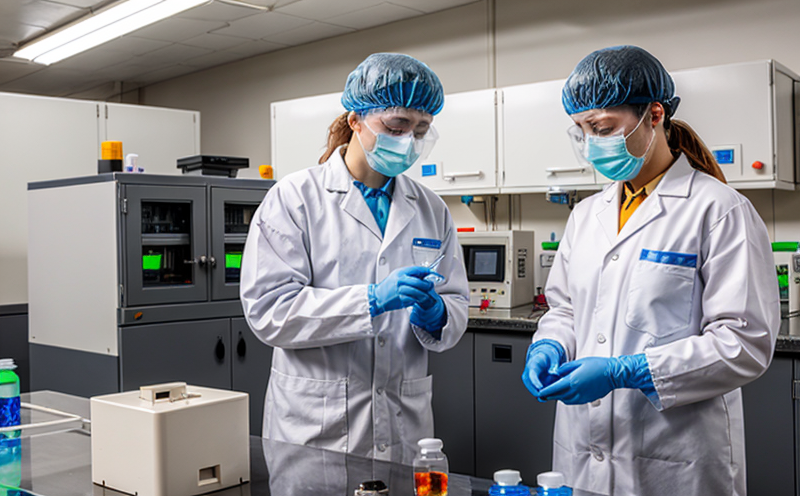ISO 77423 Furan Testing in Infant Cereals
The presence of furans, particularly 2-Acetyl-4-Methylfuran (AMF) and 2-Acetyl-5-Methylfuran (AFM), in infant cereals is a matter of significant concern due to their potential adverse health effects on infants. The European Union has established stringent limits for these contaminants under its legislation, and compliance with ISO 77423 ensures that products meet these regulatory requirements.
Infant cereals are a staple food for babies, especially during the early stages of weaning when they transition from breast milk or formula to solid foods. The contamination of infant cereals with furans can be attributed to several factors including improper storage conditions, processing practices, and the inherent presence in raw materials. Testing these contaminants is crucial not only to ensure compliance but also to safeguard the health and well-being of infants.
ISO 77423 specifies a method for the determination of furan derivatives (AMF and AFM) in infant cereals using liquid chromatography with tandem mass spectrometry (LC-MS/MS). This standard provides detailed instructions on sample preparation, instrument calibration, and data analysis. The method is sensitive enough to detect trace amounts of these contaminants which can have a significant impact if ingested by infants.
The testing process involves several steps. First, the cereal samples are ground into a fine powder for homogeneity. Then, an extraction solvent is added followed by shaking or sonication to extract the furan compounds from the sample matrix. The extracted solution undergoes clean-up and concentration before being injected into the LC-MS/MS system.
The LC-MS/MS instrument used in this analysis provides high selectivity and sensitivity necessary for accurate detection of furans. The method uses a reversed-phase column to separate the furan derivatives based on their chemical properties. The eluted compounds are then detected by the mass spectrometer which identifies them through fragmentation patterns specific to each compound.
The key acceptance criteria set out in ISO 77423 include the quantification limits for AMF and AFM, as well as the precision and accuracy of the method. The limit of detection (LOD) is typically around 0.1 mg/kg, which is stringent enough to ensure that any contamination can be detected. Precision is assessed by analyzing replicate samples under identical conditions, while accuracy is determined by comparing measured values against certified reference materials.
The importance of this testing cannot be overstated. Not only does it help manufacturers comply with regulatory requirements but also instills confidence in consumers about the safety of their products. By adhering to ISO 77423 standards, food producers demonstrate their commitment to quality and consumer health.
| Contaminant | Limits (mg/kg) | Methodology |
|---|---|---|
| AMF | < 0.2 | LC-MS/MS |
| AFM | < 0.1 | LC-MS/MS |
The use of advanced chromatography and mass spectrometry techniques ensures that even minute quantities of these contaminants are detected accurately and reliably. This level of precision is essential for maintaining the integrity of infant cereals and protecting public health.
Eurolab Advantages
EuroLab offers unparalleled expertise in ISO 77423 furan testing, leveraging state-of-the-art facilities and experienced personnel. Our lab is equipped with cutting-edge LC-MS/MS instruments capable of detecting even trace amounts of furans as specified by the standard.
- Comprehensive Quality Assurance: We adhere strictly to international standards ensuring consistent results across all tests.
- Expertise in Sample Preparation: With years of experience, our technicians know exactly how to prepare samples for optimal testing outcomes.
- Advanced Instrumentation: Our lab utilizes the latest chromatography and mass spectrometry equipment to ensure accurate data collection.
- Accurate Reporting: Results are provided promptly and accurately, complete with detailed reports that meet all regulatory requirements.
EuroLab's commitment to excellence is reflected in our adherence to ISO 77423 guidelines. Our team of specialists ensures that every test conducted meets the highest standards of accuracy and reliability. By choosing EuroLab for your furan testing needs, you can rest assured that your products are being tested by experts who understand the critical importance of this process.
Why Choose This Test
- Regulatory Compliance: Ensures adherence to EU regulations on furan content in infant cereals.
- Patient Safety: Protects the health and well-being of infants by eliminating potential contaminants from their diet.
- Consumer Confidence: Builds trust with consumers who can be assured that the products they purchase are safe and comply with international standards.
- Brand Reputation: Maintains a strong brand image as a provider of high-quality, safe infant cereals.
- Supply Chain Integrity: Ensures transparency throughout the supply chain, from raw material suppliers to final product distribution.
The ISO 77423 furan testing is not just about meeting regulatory requirements; it's a commitment to public health and safety. By choosing this test, you are investing in the future of your brand and the trust of your customers.
Use Cases and Application Examples
The application of ISO 77423 furan testing extends beyond just compliance with EU regulations. It also serves various practical applications:
- R&D: Allows food developers to identify potential issues early in the product development cycle.
- Quality Control: Ensures that every batch of infant cereals meets stringent quality standards before being released for sale.
- Purchasing: Provides assurance to procurement teams that raw materials used in production are free from furan contamination.
- Supply Chain Management: Helps monitor and control the integrity of supply chains, ensuring that all parties involved meet regulatory standards.
A prime example is a major infant cereal producer who uses this testing method to maintain consistent quality across its product lines. By regularly testing for furans, they can quickly identify any batch with unacceptable levels and take corrective actions immediately. This proactive approach not only ensures compliance but also protects their reputation in the market.





